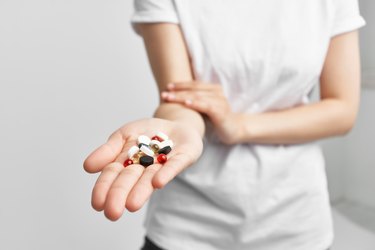
Vitamin B12, along with the rest of what's known as the B complex vitamins, is an essential nutrient for good health. Vitamins are micronutrients, meaning that your body only requires them in small quantities.
A vitamin-rich diet can help you stave off many diseases. The U.S. National Library of Medicine explains that B complex vitamins are water-soluble and the body doesn't store them. B12 is the B vitamin your body requires in the smallest amount, yet it's as essential as its counterparts.
Video of the Day
Video of the Day
B Complex Contents
What's known as a vitamin B complex represents eight distinct vitamins, including vitamin B12. According to the Academy of Nutrition and Dietetics, the other seven B vitamins are:
- thiamine, also known as B1
- riboflavin, or B2
- niacin, sometimes called nicotinamide or nicotinic acid amide
- pantothenic acid, also called B5
- pyridoxine, or B6
- biotin, or B7
- folic acid, sometimes called folate or B9
B12 and folate both can't be produced in the body and so you must get them from food. your body can store up to several years' worth of B12 supply, depending on your diet and health status, according to Lab Tests Online.
Functions of B12 and Other B Vitamins
Also known as cobalamin, vitamin B12 is vital because your body uses it for functions like cell metabolism, according to the Academy of Nutrition and Dietetics. It's also important for creating DNA, per the National Institutes of Health (NIH).
Vitamin B12 also creates new red blood cells. Because of this, a vitamin B12 deficiency could cause a person to develop anemia, per the Mayo Clinic.
B complex vitamins play critical roles in your body, especially in metabolizing food and converting it into energy, according to the Academy of Nutrition and Dietetics.
One important B vitamin is B6, which helps insulin production and form nonessential amino acids, the compounds that make up proteins.
Another noteworthy B vitamin is B9, better known as folate or folic acid. This vitamin is critical for pregnant people or people who are trying to conceive, as folate prevents brain- and spine-related birth defects in the developing fetus, according to the Mayo Clinic.
Food Sources of Vitamin B
Supplements can provide you with a combination of B vitamins and other nutrients. But you can also get B vitamins from food. The top sources of B vitamins include the following, per the University of Wyoming:
- Fortified grain products, such as fortified cereal and fortified bread
- Nuts and legumes
- Fruits
- Green vegetables
- Dairy products
- Meats, especially organ meat
Eating a vegan or vegetarian diet puts you at a greater risk for a B12 deficiency because this vitamin naturally occurs in animal products only. Adding foods fortified with the essential B vitamins can help ensure you get what you need, as your body is able to easily use the nutrients in fortified foods, according to the NIH.
Related Reading
Can You Take B Complex and B12 Together?
Taking both isn't the best idea. This isn't because it's dangerous — instead, it's just because it's unnecessary. Your B complex supplement probably already has vitamin B12, so there's no need to take a separate pill, explains the Mount Sinai Health System.
But if you do take both supplements, you don't have to worry about overdosing on B vitamins. If you take too much vitamin B12 via supplements, your body will use the amount that it needs and eliminate any excess amount through your urine, according to the Mayo Clinic.
But extremely high levels of vitamin B12 may bring on some mild side effects, including headaches, fatigue and nausea.
Which Vitamin Should You Take?
If you're concerned about your intake of any B vitamins and you can't increase your intake through the foods you're eating, consider taking a vitamin or supplement.
But, there's no one-size-fits-all solution to what vitamin supplement is best for any individual's needs. You should talk with your doctor to determine whether any dietary supplements you're taking might interfere with your medications or cause unexpected side effects.
Second to healthy foods, a multivitamin might be the best option for anyone looking to get more vitamin B12, according to Harvard Health Publishing. This is especially true for adults over age 50, who are at an increased risk for vitamin B12 deficiency.
A typical multivitamin will have about 400 percent of your daily needed vitamin B12, meaning your body will have plenty to absorb (and even some left over, which it'll eliminate), per Harvard Health Publishing. A multivitamin will likely also contain other B vitamins as well.
- University of Virginia School of Medicine: Vitamin B12 - No One Should Be Without
- Mayo Clinic: Vitamin B-12
- Mount Sinai: Vitamin B12 (Cobalamin)
- Harvard Medical School: The A List for Vitamin B-12 Sources
- U.S. National Library of Medicine: Vitamins
- Academy of Nutrition and Dietetics: What are B Vitamins?
- University of Wyoming: Meet the B Vitamins
- National Institutes of Health: Vitamin B12
- Lab Tests Online: Vitamin B12 and Folate Deficiencies
- Mayo Clinic: "Folate (Folic Acid)"